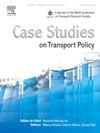Qatar’s success story during FIFA world Cup 2022: Role of travel demand management and impact on travel behavior
IF 2.4
Q3 TRANSPORTATION
引用次数: 0
Abstract
The FIFA World Cup Qatar 2022 (FWC2022) presented transportation challenges for host cities, prompting Qatar to implement extensive Travel Demand Management (TDM) measures. This study evaluates the effectiveness of these strategies in managing travel demand and influencing resident behavior during the event, offering valuable insights for future urban mobility initiatives. Utilizing a mixed-methods approach that combined quantitative public transport ridership analysis with qualitative resident surveys. We observed a 73% increase in metro ridership and a reduction of 2.8 car trips per week, demonstrating a shift in travel preferences during the FIFA World Cup 2022 (FWC2022). Public transport fare discounts (60% rated highly influential) and temporary school closures (62%) were particularly effective. The findings indicate that 66% of respondents expressed a willingness to maintain their travel changes post-FWC2022 if TDM measures, like lower fares and extended public transport hours, continue. The scalability of these insights to other developing countries is promising, as many urban areas face similar challenges, including congestion and inadequate public transport. The FWC2022 experience highlights the importance of context-specific TDM strategies that consider local demographics and infrastructure. By fostering a culture of sustainable mobility, cities can adopt flexible approaches to accommodate unique commuting patterns and improve transport systems for future mega-events. Our study acknowledges limitations, including the exclusion of tourist behavior and reliance on self-reported data, which highlights the need for further research to include pre-post studies and more objective data collection methods. Future work should also explore promoting alternative transportation options and develop mobility strategies tailored to distinct population segments.
卡塔尔在2022年世界杯期间的成功案例:旅游需求管理的作用及其对旅游行为的影响
2022年卡塔尔世界杯(FWC2022)给主办城市带来了交通方面的挑战,促使卡塔尔实施了广泛的旅行需求管理(TDM)措施。本研究评估了这些策略在管理出行需求和影响活动期间居民行为方面的有效性,为未来的城市交通倡议提供了有价值的见解。采用混合方法,将定量公共交通客流量分析与定性居民调查相结合。我们观察到地铁客流量增加了73%,每周汽车出行减少了2.8次,这表明在2022年FIFA世界杯(FWC2022)期间,人们的出行偏好发生了变化。公共交通票价折扣(60%的人认为影响很大)和临时关闭学校(62%)尤其有效。调查结果显示,66%的受访者表示,如果TDM措施(如更低的票价和延长公共交通时间)继续下去,他们愿意在fwc2022之后维持他们的出行变化。由于许多城市地区面临着类似的挑战,包括拥堵和公共交通不足,这些见解在其他发展中国家的可扩展性是有希望的。FWC2022的经验强调了考虑当地人口和基础设施的因地制宜的TDM战略的重要性。通过培养可持续的交通文化,城市可以采取灵活的方法来适应独特的通勤模式,并改善交通系统,以应对未来的大型活动。我们的研究承认局限性,包括排除游客行为和依赖自我报告的数据,这突出了需要进一步的研究,包括前后研究和更客观的数据收集方法。未来的工作还应探讨促进其他交通选择,并制定适合不同人口群体的流动战略。
本文章由计算机程序翻译,如有差异,请以英文原文为准。
求助全文
约1分钟内获得全文
求助全文

 求助内容:
求助内容: 应助结果提醒方式:
应助结果提醒方式:


